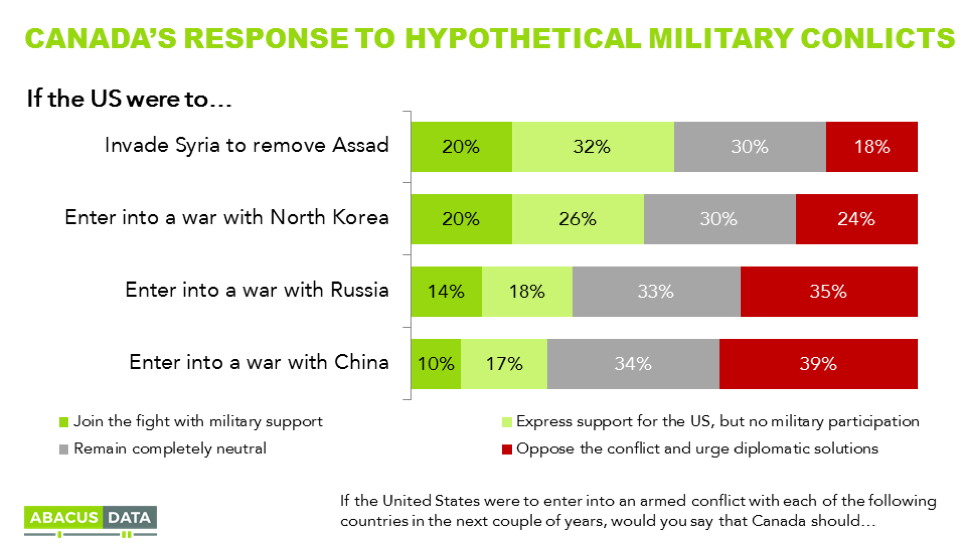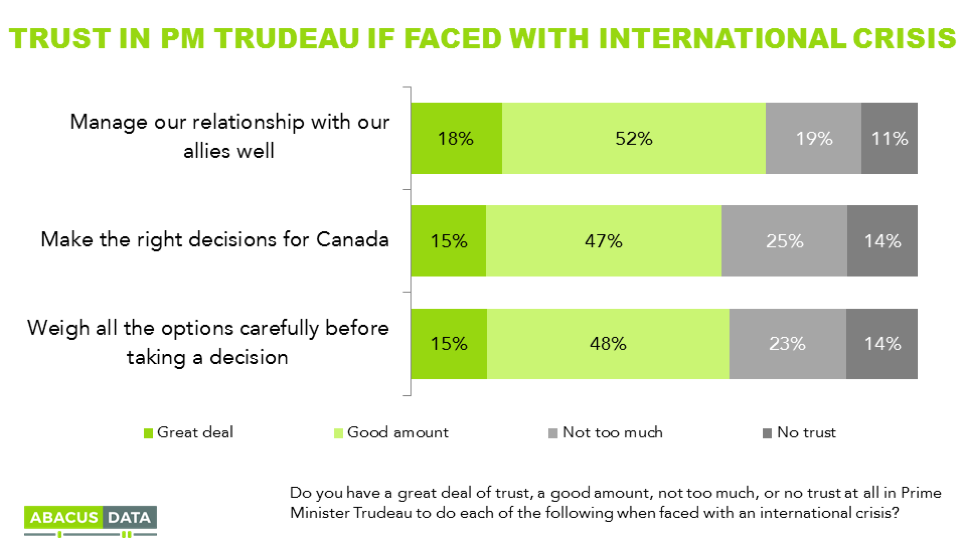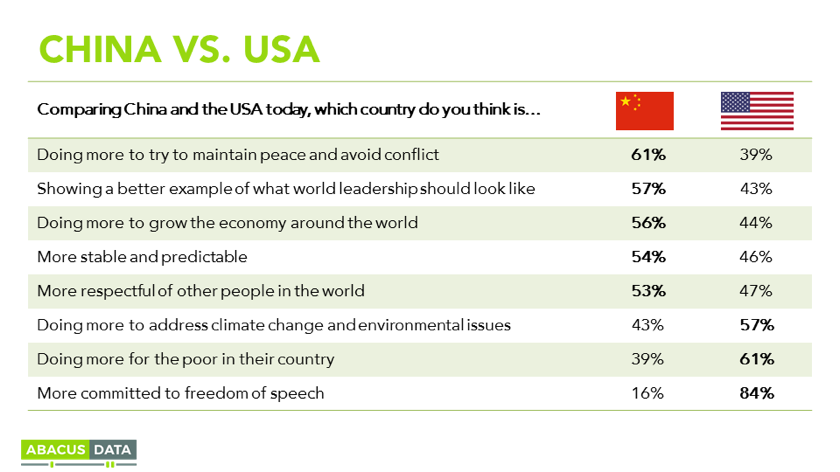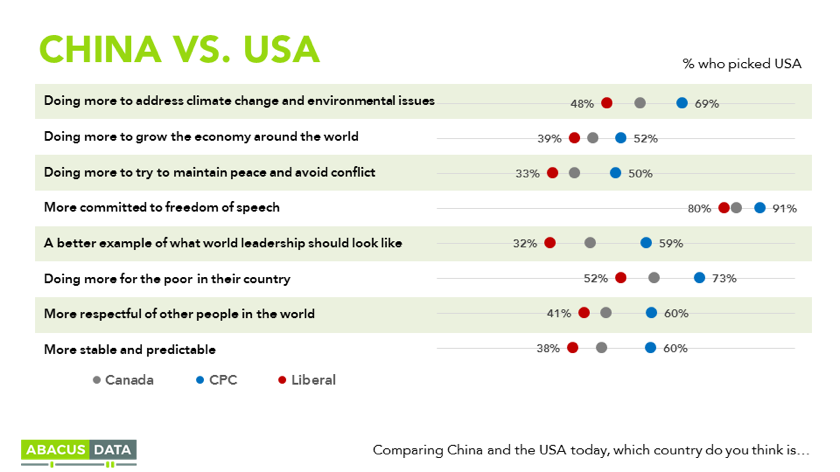Tensions Rising: Canadian Views on Foreign Conflict, China, & Trudeau in an International Crisis
April 27, 2017
For generations, Canada’s interests, foreign policy and view of the world has been aligned with that of the United States. This alignment has not always been perfect and disputes have arisen on occasions, but today there are reasons to wonder if the future will be different from the past when it comes to how closely Canadians feel to our neighbors to the south.
Currently, only 20% feel “Canada should try to be more like the United States” while 80% disagree with that idea.
There is a broad feeling among Canadians (79%) that tensions around the world are rising, while only 3% say that tensions are easing. Given that US President Trump has adopted a more aggressive approach with a number of countries around the world, we wanted to know how Canadians would react to the possibility of armed conflict. Here’s what we found.
SYRIA
20% would want Canada to join a military effort to remove President Assad of Syria. Another 32% would want Canada to express support but not provide military aid. 30% would favour neutrality and 18% say they would want Canada to oppose a conflict and urge diplomatic solutions.
NORTH KOREA
20% say that Canada should join the US if it enters a military conflict with North Korea. Another 26% say we should express support for the US but no military participation. 30% say we should take a neutral position, and 24% say we should oppose conflict and urge diplomatic solutions.
RUSSIA
Only 14% would want Canada to join the US militarily in a conflict with Russia, and another 18% would favour moral support. 33% would prefer neutrality and 35% would want Canada to oppose such a conflict.
CHINA
Only 10% say Canada should join the US militarily if it entered into a conflict with China, and only 17% would want Canada to express support (but no military participation. 34% would favour neutrality and 39% say Canada should express opposition to a conflict.
In short, no more than 20% would want Canada to join the US in any of these hypothetical armed conflicts, while about half or more in each case would prefer to see Canada take a neutral position or oppose conflict and urge diplomacy.
These results vary somewhat, but not all that much, by party affiliation. Conservative voters are more likely to support the idea of joining the US militarily, but still, only 30% of CPC voters would want our troops involved in a Syrian invasion, 32% in a conflict with North Korea, just 21% with Russia and only 16% with China.

CONFIDENCE IN PM TRUDEAU
We asked respondents to let us know how much confidence they had in Prime Minister Trudeau if he were “faced with an international crisis”.
- 70% have a great deal or a good amount of confidence Mr. Trudeau would “manage our relationship with our allies well”, including 38% of CPC voters and 69% of NDP voters.
- 63% have confidence he would “weigh all the options carefully before making a decision”, including 33% of CPC voters and 58% of NDP voters.
- 62% have confidence he would “make the right decision for Canada”, including 29% of CPC voters and 57% of NDP voters.

COMPARING CHINA AND THE UNITED STATES
Given the emergence of China as a high-profile participant in global discussions in recent years as well as one of the most important economies in the world, we decided to ask Canadians to compare the US and China on a number of dimensions.
The results paint a remarkable picture where China is seen as playing a more positive role in some respects even that Canada’s closest traditional ally.
Majorities say China is:
• Doing more than the US to try to maintain peace and avoid conflict (61%)
• Doing more than the US to try to maintain peace and avoid conflict (61%)
• Showing a better example of what world leadership should look like (57%)
• Doing more to grow the economy around the world (56%)
• More stable and predictable (54%)
• More respectful of other people around the world (53%)
Majorities say the US is:
• More committed to freedom of speech (84%)
• Doing more for the poor in their country (61%)
• Doing more to address climate change and environmental issues (57%)

Conservative and Liberal voters react differently on some of these items, with CPC voters giving more credit to the US and showing more skepticism about China. However, these differences are in some cases more modest than might have been anticipated.

UPSHOT
The role of China in the world has been changing and so has that of the United States. Canadians have been watching these events unfold and opinions are clearly evolving. For many people, China looks like a more stable and predictable power, one that evinces more respect for others and is doing more to raise economic prospects around the world. None of these observations would have been as common only a few years ago.
Inevitably, these impressions are a function not only of what China has been doing but also the way in which Canadians are seeing the US with Donald Trump as it’s leader.
Broad reluctance to join a military conflict that Mr. Trump might consider is just one illustration – many seem also to feel that America under Trump seems to lack respect for people in other parts of the world.
That so few believe Canada should be more like America is an illustration that for many Canadians, Trump’s America is not, for the moment anyway, a “shining city on a hill.
METHODOLOGY
Our survey was conducted online with 1,500 Canadians aged 18 and over from April 21 to 24, 2017. A random sample of panelists was invited to complete the survey from a large representative panel of over 500,000 Canadians.
The Marketing Research and Intelligence Association policy limits statements about margins of sampling error for most online surveys. The margin of error for a comparable probability-based random sample of 1,500 is +/- 2.6%, 19 times out of 20.
The data were weighted according to census data to ensure that the sample matched Canada’s population according to age, gender, educational attainment, and region. Totals may not add up to 100 due to rounding.
ABACUS DATA INC.
We offer global research capacity with a strong focus on customer service, attention to detail and value-added insight. Our team combines the experience of our Chairman Bruce Anderson, one of Canada’s leading research executives for two decades, with the energy, creativity and research expertise of CEO David Coletto, Ph.D.




